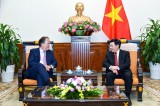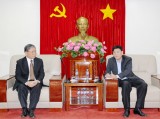Vietnam prepares for ASEAN Chairmanship in 2020
Vietnam actively contributed to the Association of Southeast Asian Nations (ASEAN) in 2018, which will serve as the foundation for the country to perform the ASEAN Chairmanship in 2020, said Ambassador Tran Duc Binh, Vietnam’s Permanent Representative to ASEAN.

In an interview granted to the Vietnam News Agency, the ambassador reviewed Vietnam’s marked contributions to the ten-member group last year, citing the organisation of the World Economic Forum on ASEAN in Hanoi in September.
At the forum, Prime Minister Nguyen Xuan Phuc and other ASEAN leaders outlined orientations to spur regional economy, help enterprises optimise advantages of the fourth Industrial Revolution and create a favourable investment environment in the bloc, he said, noting that the PM’s initiatives raised at the event received applause of other leaders.
In 2018, Vietnam worked as the ASEAN Coordinator for the Regional Comprehensive Economic Partnership (RCEP) negotiations in the sphere of investment, and partnered with relevant countries to build a commitment package that aims to lay a foundation for the conclusion of the talks slated for 2019, Binh added.
He said PM Phuc and his Indian counterpart Narendra Modi successfully co-chaired a high-level meeting marking the 25th anniversary of the ASEAN-India relationship in New Delhi, which has been seen as a step forward to promoting the bilateral ties.
Vietnam also outstandingly performed its role as the coordinator of the ASEAN-India relations between August 2015 and August 2018, and is assuming the mission in the ASEAN-Japan relations from August 2018 to August 2021.
The country has prioritised the implementation of the master plan on ASEAN connectivity and proposed projects attractive to financial institutions as well as the private sector, the ambassador stressed.
Regarding ASEAN’s performance in the year, Binh said despite the complex regional and global situations, the bloc remained a spotlight of cooperation, with cooperative activities covering the three areas of politics-security, economy and culture-society.
ASEAN has maintained a peaceful and stable environment that is favourable for economic development and connectivity, as well as community building.
The most noteworthy result lies with the establishment of a network of smart cities with the participation of 26 cities of the ASEAN member countries, including Vietnam’s Hanoi, Ho Chi Minh City and Da Nang, to deal with urban challenges to improve the living conditions of people.
Apart from economic achievements, ASEAN has made progress in consolidating its relations with other countries like China, Japan and India, the ambassador said, adding that the group has elevated its relationship with Russia to a strategic partnership, raising its strategic partners to eight.
ASEAN and China also agreed on a “single draft” negotiating text of a Code of Conduct (COC) in the East Sea, thus facilitating their negotiations in the time ahead.
In 2018, ASEAN set the target of continuing to push ahead with the implementation of commitments to building the ASEAN Economic Community in 2025, enhancing regional economic connectivity and creating optimal conditions for businesses.
To that end, up to 23 specialised working plans and 80 out of the 118 priorities were carried out in the year, according to the ambassador.
As a result, the bloc’s GDP grew about 5.1 percent in 2018 and is expected to be maintained in the years to come, the ambassador said, noting that the grouping has employed measures to facilitate trade and investment, aiming to double intra-bloc trade by 2030.
Besides, ASEAN has actively realised free trade commitments with such partners as China, Japan, the Republic of Korea (RoK) and India, Binh said.
VNA
 PM’s trip to bolster Vietnam-Brazil comprehensive partnership
PM’s trip to bolster Vietnam-Brazil comprehensive partnership
 Provincial leader receives Vietnamese Ambassador to Germany
Provincial leader receives Vietnamese Ambassador to Germany
 NA Standing Committee to convene 39th session
NA Standing Committee to convene 39th session
 Focal dirctive and leadership set for success of all-level Party congresses
Focal dirctive and leadership set for success of all-level Party congresses
 Preparations for all-level Party congresses ensure progress under provincial Party Standing Committee's plan
Preparations for all-level Party congresses ensure progress under provincial Party Standing Committee's plan
 Province's development achievements come from the strength of unity...
Province's development achievements come from the strength of unity...
 Prime Minister chairs Government’s regular meeting
Prime Minister chairs Government’s regular meeting
 PM urges stronger Vietnam - China cultural, tourism links
PM urges stronger Vietnam - China cultural, tourism links
 In seeking for measures to match CPV guidelines and public inspiration
In seeking for measures to match CPV guidelines and public inspiration
 In 2025, province prioritizes capital allocation for key projects
In 2025, province prioritizes capital allocation for key projects








